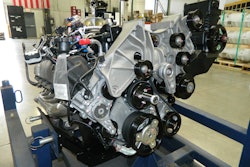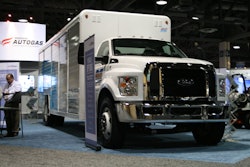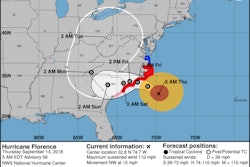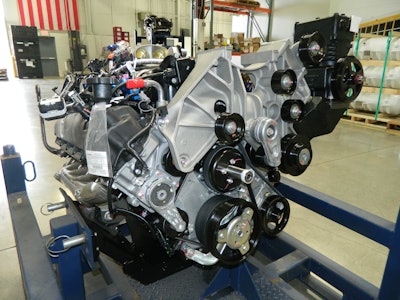
Roush CleanTech’s passion for alternative fuel keeps it on the cutting edge of propane, CNG and now electric powertrain development.
The Michigan-based company recently announced the nation’s first near-zero propane engine, a 6.8-liter V10 3V propane engine for Class 4-7 vehicles that earned a .02 grams per brake horsepower-hour (g/bhp-hr) rating from the California Air Resources Board (CARB).
And now Roush plans to unveil another first.
 Mouw
Mouw“Later this year we anticipate unveiling the first fleet running a .02 engine of ours with renewable propane,” Roush CleanTech President Todd Mouw told Hard Working Trucks. “More to come on that. Our goal would be to roll that out probably in California some time in the fourth quarter.”
Renewable or biopropane is a byproduct of renewable diesel production. It’s commercially available in Europe and Asia where renewable diesel is more widely produced. One of the fuel’s major supporters in the U.S. includes leading alternative fuel consulting firm Gladstein, Neandross & Associates.
“Renewable propane can help transform our transportation sector,” GNA Senior Vice President Jon Leonard writes in a report on the fuel. “Over the long term, California (and all of America) needs vehicles and other combustion-based commercial products that can simultaneously deliver near-zero-emission levels while operating on very-low-GHG renewable fuels.”
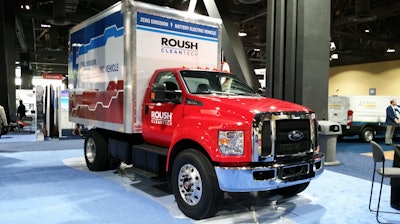 Roush CleanTech’s electric Ford F-650 prototype was unveiled at ACT Expo in May.
Roush CleanTech’s electric Ford F-650 prototype was unveiled at ACT Expo in May.Roush CleanTech also remains dedicated to developing its electric powertrain program. Earlier this year at Advanced Clean Transportation Expo in Long Beach, Calif., Roush unveiled its all-electric Ford F-650 prototype. The box truck attracted plenty of attention.
“We’re still anticipating launch around mid 2020. We anticipate having alpha units on the road late Q1, early Q2 of next year,” Mouw said. “Any fleets that are interested in participating in those trials or providing their feedback in regards to what they want—whether that’s payload, whether that’s range, whatever those things are that are important to that fleet, those inputs should be coming to us now because they will help us develop the product that will help develop their need.”
Mouw talked with HWT at length about his company’s growing interest in alt fuel technology, an important topic that’s gaining more interest among fleets especially as states and companies alike continue preparing for the national distribution of $2.7 billion in VW settlement funds.
HWT: Congratulations on the .02 propane engine. That’s got to be exciting news.
Mouw: We’re excited about it. When you look at the business and how we’re trying to grow the business, and what’s symbolic and important politically. We’ve seen the last three or four years that NOx will become more important in the landscape, especially with VW (settlement money), but also just seeing what CARB will do with its optional standards. We knew that that was going to be important for us to keep propane on par with the other choices that we have to give here so that it’s possible. We were excited about it because we think it’s a big breakthrough for propane as well as what we’re doing with Ford engines. We think it’s a good step for what had to happen and we’re glad that we’re the ones to do it.
HWT: Are you looking to develop a .02 CNG engine as well?
Mouw: So we are. I can’t tell you all the details, but if you look today on natural gas we’re certified at .1 grams bhp-hr. Our mission is for whatever product we offer, our goal is to get that to the lowest NOx level possible. So that would be a good target for us to get to .02 as well on natural gas.
HWT: Has it been difficult getting certification in California?
Mouw: So I think we have some credibility there that makes it easier for us than others. I think there’s a trust that they know we’re doing things the right way. I think it’s still difficult but I think it’s easier for us probably than others. Some of it is perception too. Ultimately, propane has not been viewed favorably in California as an option as a clean air product. Yes, it’s been available but it’s a byproduct of refineries—an oil byproduct, even though a lot of it comes from natural gas now. So again, I think with all the push for electric style solutions, it’s not been viewed that favorably. So I think it’s more symbolic in my opinion that we show that it can be done and especially with some options coming related to renewable propane that we think that we can be that near-zero that electric is with our low NOx engine with a renewable propane source. So, that being said, I think ARB is very supportive of anything that’s non-diesel; they see us as another great solution that helps fleets make that transition away from diesel. I think they’re supportive and doing all the things they need to do to get us to the levels that we just achieved. We feel a lot more comfortable than we did 10 years ago because that was new space for us, but again I think we’ve made them comfortable with the way we do things and the benefits of propane. Propane is an option where maybe electric or natural gas doesn’t play. ARB can then tell constituents, ‘You’ve got other options besides natural gas or EV. You also have propane.’ I think everybody wins in that case.


